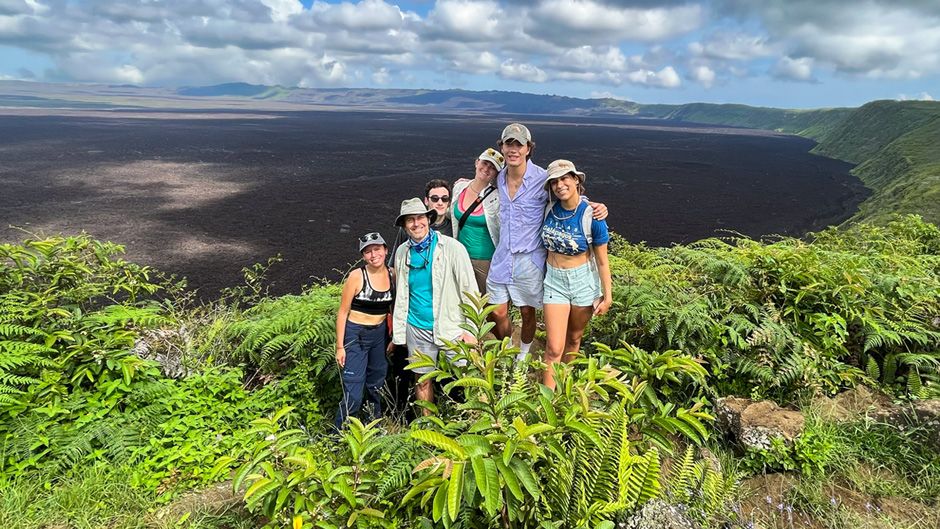When Scott Pollowitz heard about a unique study abroad program to learn about wildlife in Ecuador and the Galápagos Islands, he was intrigued.
So was Isabella Arosemena, who said the UGalapagos Biology program attracted her to the University of Miami.
In 2023 Arosemena and Pollowitz got the chance to swim with sea lions in the Galápagos Islands, feed hummingbirds in the Andes, hike around a volcano, snorkel along the reefs of the tropical Pacific Ocean, collect field data in the Amazon rainforest, and much more.
“The diversity of experiences we had was fantastic, especially because we were studying ecology and saw so many different biomes,” said Arosemena, a senior studying ecosystem science and policy in the College of Arts and Sciences. “We spent two months in Quito, the capital of Ecuador, but we also had weekly field trips to the cloud forest, the Northern Andean paramo, and took classes in the Amazon where we lived for a week. These are things that not many people get the chance to do.”
This coming fall, biology assistant professors Juan Pablo Quimbayo and Neil Rosser are hoping that even more students will join them on a renewed UGalapagos Biology program. Open to all University undergraduates, the semester-long experience allows students to live with a host family in Quito and the Galápagos Islands while they take courses through the Universidad San Francisco de Quito focused on biology and field research.
“Spending a semester abroad is a life-changing experience,” Rosser said. “This is an immersive cultural experience, as students will be living with host families, but they will also get to see one of the most biodiverse countries in the world, from snow-capped volcanoes to the Amazon, and the tropical islands that were fundamental to developing the idea of evolution.”
Quimbayo and Rosser look forward to teaching two of the program’s five modules, while faculty members from the Universidad San Francisco de Quito will lead the other three. Quimbayo will be teaching Reef Ecology in the islands, and Rosser will lead a module called Tropical Biodiversity. In 2023 one module was taught by University biology professor Kenneth Feeley. UGalapagos Biology is offered again from August to December this fall, but applications are due next week, on March 1.
Students can earn 16 course credits from the program through its five modules, as well as a minor in biology. There is also a UGalapagos marine science program offered through the Rosenstiel School of Marine, Atmospheric, and Earth Science during fall and spring semesters, but it is limited to Rosenstiel School undergraduates. Students in that program remain in the Galápagos Islands the entire semester.
Although both Pollowitz and Arosemena had a passion for the environment before attending the program, their interest only grew during their 15 weeks in Ecuador and the Galápagos.
“I don’t think there’s any other study abroad experience like it,” said Pollowitz, who graduated in May 2024 and currently works at a local environmental consulting firm called Conservation Concepts. “We learned about biology hands-on in these environments, so I thought it would be a very valuable life experience, and it was.”
Arosemena was inspired to complete new minors in anthropology and motion pictures from her experience. After graduating this spring, she wants to go on to graduate school to produce nature documentaries.
“It was the opportunity of a lifetime but also helped me develop within my career field,” Arosemena said. “It was my first experience with fieldwork and scientific writing, and my eyes were also opened to the experience of Ecuadorians and Indigenous Amazonians, which helped me find an interest in anthropology and Indigenous studies.”
Students interested in applying can attend an information session at 12:30 p.m. on Friday, Feb. 28 in the lobby of the Cox Science Building, or email Neil Rosser or Juan Pablo Quimbayo. Applications are due to the Office of Study Abroad by March 1.

